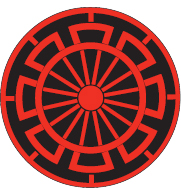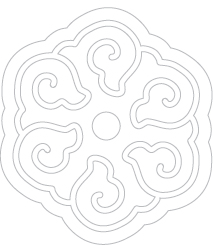

Since the publication of Sun Tzu’s Art of War, military scholars have devised many explanations of the “extraordinary and normal forces.” In the book Sun Tzu as Annotated by Eleven Scholars (Sung Dynasty Edition), one of the annotators, Wei Liaozi, said: “The forces sent first to confront the enemy are normal ones, and sent later to attack the enemy are extraordinary ones.” Cao Cao said something to the same effect.
In A Dialogue Between Tang and Li, Tang Taizong told Li Jing: “My normal forces would seem extraordinary to the enemy, and my extraordinary seem normal. That is exactly what is called deception. Extraordinary forces appear to be normal and normal, extraordinary; changes are unpredictable.”
Li Jing also commented on the victory of the Battle of Huo Yi: “It would have been impossible for us to win, if normal forces had not been disguised as extraordinary and extraordinary, normal. Therefore, it all depends on the commander who decides how and when to use normal force or extraordinary.”
Commenting on the subject, Marshal Liu Bocheng explained: “The normal forces and extraordinary forces are a dialectical unity, of which all generals must have a good grasp. Extraordinary forces contain normal ones, and normal, extraordinary. There should be unpredictable changes in them. . . . What are the normal forces? Generally speaking, forces which fight in a regular way according to usual tactical principles are normal forces. Forces which fight otherwise and move stealthily and attack the enemy by surprise are extraordinary ones.”
Sun Tzu did not devote a separate chapter to the subject of the normal and extraordinary forces, but he included it in the chapter entitled “Posture of Army.” For instance, he wrote: “There are unending changes of the normal and extraordinary forces. They end and recommence—cyclical, as are the movements of the sun and moon. They die away and are reborn—recurrent, as are the passing seasons. Generally, in battle, use the normal force to engage the enemy and the extraordinary to win. Therefore, the resources of those skilled in the use of extraordinary forces are as infinite as the heavens and earth, as inexhaustible as the flow of the great rivers. . . . It is the skillful operation of the extraordinary and the normal forces that make an army capable of sustaining the enemy’s attack without suffering defeat.”
It must be pointed out that Sun Tzu’s use of the word “cyclical” seems to imply “cyclicalism.” However, a careful study of the context would reveal that he used it as a metaphor to describe the changeability and unpredictability of employing extraordinary and normal forces. It is in no way related to cyclicalism and metaphysics, which denies the spiral development of all things.
There have been numerous examples of battles in Chinese history in which victory has been achieved by catching the enemy by surprise.
In the year 279 B.C., Qi’s general, Tian Dan, was besieged in the city of Jimo. In order to save the kingdom of Qi, Tian Dan thought of a scheme. He collected more than a thousand oxen and covered each of them with a colorful cloth, then tied sharp daggers on their horns and dried reeds dipped in oil on their tails. He assembled five thousand soldiers all disguised as monsters. When night fell and the soldiers of the Yen army were all sound asleep, he lit the reeds on the oxen’s tails. The oxen dashed towards the camps of the Yen army followed by Tian Dan’s five thousand soldiers. The Yen army was caught by surprise and thrown into utter chaos. In this battle, Yen’s troops were totally wiped out, and thereafter the victorious Tian Dan recaptured more than seventy cities in succession. The kingdom of Qi was saved from conquest. The battle was called the “Formation of Oxen with Fire” and has become a famous example of taking the enemy by surprise.
In the year 263 A.D., in the late period of the Three Kingdoms, General Deng Ai of the kingdom of Wei was asked to attack the kingdom of Shu. Normally they had to attack Jianman Pass first. Knowing the pass was strongly fortified, Deng Ai directed his ten thousand troops to outflank the enemy. They marched along small paths in the Yingping Mountain Valley, crossing about two hundred miles of no man’s land and even tunnelling through mountains. When they came to the perilous Mage Mountain, there was not even a path. He wrapped his body with a blanket and rolled down the mountain at the head of his men. Then his men came down one after another with the help of ropes, and quickly occupied Jiangyou Pass, and soon after, the city of Mianzu. They advanced swiftly and reached Chengdu in November, taking the enemy by surprise. Liu Shan, general of Shu, was forced to surrender. This battle has been known for its suddenness and unexpectedness.
In the year 200 A.D., the troops of Cao Cao and Yuan Shao met in a confrontation at Guan Du. Yuan’s troops were well provisioned and, therefore, able to withstand a protracted war, while Cao’s troops ran short of provisions and could only fight a quick battle. Cao Cao was at his wit’s end and very worried. Then, Xu You, one of Yuan’s counsellors who committed crimes and feared prosecution, joined sides with Cao Cao, who was pleased to accept him.
At their meeting, Cao Cao said: “I want to defeat Yuan’s army in a quick strike, but I think I am not able to do so because of the big gap in our strength. I am thinking of retreating but afraid of pursuit by Yuan’s army. I hope you can give me counsel.”
Xu asked Cao: “What do you think is the key problem in the battlefield?”
Cao said: “Yuan Shao can fight a protracted war because his provisions are abundant, while we cannot because of our poor provisions.”
“So the key problem is provisions,” said Xu. “Yuan’s army stored their rations at Wucao, guarded only by a small force. You should raid Wucao and burn their provisions, which would surely result in chaos in Yuan’s army.”
Cao Cao followed his advice, raided Wucao, and burnt almost all of the provisions of Yuan’s army. On learning about it, Yuan’s troops were thrown into great confusion and soon retreated in disorder. Cao’s troops pursued the chaotic Yuan army and defeated it. In this single battle, hundreds of thousands of Yuan’s troops were destroyed. After that, Cao again defeated Yuan at Cang Ting.
Consequently, Yuan Shao died from a disease. His two sons fought for the throne and were both killed by Cao Cao. Since then, Cao consolidated his base in the northern area of the Central Plains and laid a solid foundation for the conquest of the whole Central Plains. As a result, the key to victory in a campaign sometimes does not lie in the battlefield but in devising apt strategies. This is another example of catching the enemy by surprise, which is called the scheme of “taking away the firewood from under the cauldron.”
These are examples of employing extraordinary forces. Similar ones were numerous in the history of the People’s Liberation Army (PLA). From them, we can say that Wei Liaozi’s annotation might not be correct—that labelling a force normal or extraordinary has nothing to do with which occurs first. Deng Ai’s extraordinary crossing of the Yingping Mountain Valley occurred before the real campaign started, as did the burning of Yuan’s provisions by Cao Cao at Wucao. The “Formation of Oxen with Fire” was arranged by Tian Dan to break the siege of the city of Jimo. Therefore, the extraordinary forces are used to take the enemy by surprise regardless of when they occur. We can safely say that Deng Ai did something normal contained in the extraordinary. Tian Dan’s formation of oxen was something extraordinary contained in the normal.
During the Hui Hai campaign launched by the PLA in 1948, the fights between the Chinese military corps and the enemy troops were considered normal forces, but they also involved the use of extraordinary forces, such as Sun Tzu wrote: “to besiege a place to annihilate the enemy relief force,” and “to make a feint to the east and attack in the west.” Therefore, we say there were unending changes of the normal and extraordinary forces.
The extraordinary and normal forces are a dialectical unity and they are interchangeable. Normal forces can be turned into extraordinary ones in accordance with the changes in the field, and vice versa. Some of the commanders did not employ troops according to normal principles, such as “fighting with one’s back to the river” or “cutting off all means of retreat,” but they won.
The employment of troops should be subject to variations. The same military principle can be applied in different ways. In Chinese history, there have been a number of wars, some lasting hundreds of years (the Spring and Autumn Warring Period), others lasting dozens of years (the anti-imperialist and anti-feudal wars in the contemporary period). The natures of these wars were obviously different; so were the ways of fighting. But many of Sun Tzu’s principles and theories of war were applied in various ways in these conflicts. For instance: making correct estimates before engaging in battles; the deft application of strategic considerations; catching the enemy by surprise; taking the initiative; knowing the enemy and knowing yourself; concentrating large numbers of troops to fight a much smaller unit of the enemy. In short, as Sun Tzu pointed out: “Ingenuity in varying tactics depends on mother wit.”
To summarize Sun Tzu’s position on the use of extraordinary and normal forces:
Employment of troops must be extraordinary and varied so that the opponents cannot predict the movement of each other’s armies. Sun Tzu said, “War is a matter of deception.” That is to say, always attempt to throw your opponent into confusion.
Always try to catch the enemy by surprise. Use your troops at a place and time which are unexpected. Always try to strike a deadly blow at the enemy’s weak point.
For the sake of extraordinary employment of troops, begin from a firm and unconquerable position. And then you should be farsighted, circumspect, courageous, and careful at the same time. Be able to move swiftly and to cope with any contingency.
Extraordinary and normal forces have interchangeable elements that resemble each other. This is dialectic in military affairs. You must avoid absolutes and not rigidly adhere to principles or articles in a military book. On the contrary, you should be flexible in applying them. Remember that there is no universal principle that leads to victory in every confrontation.
